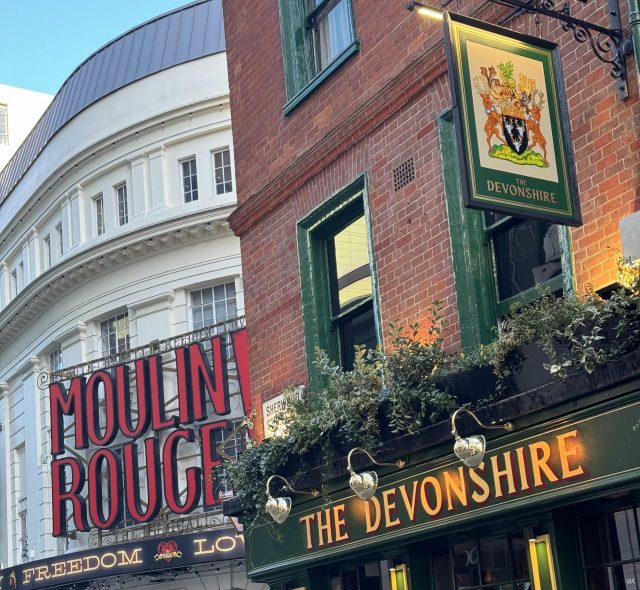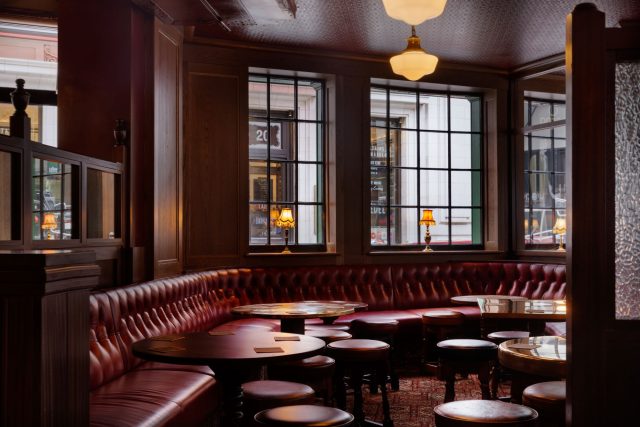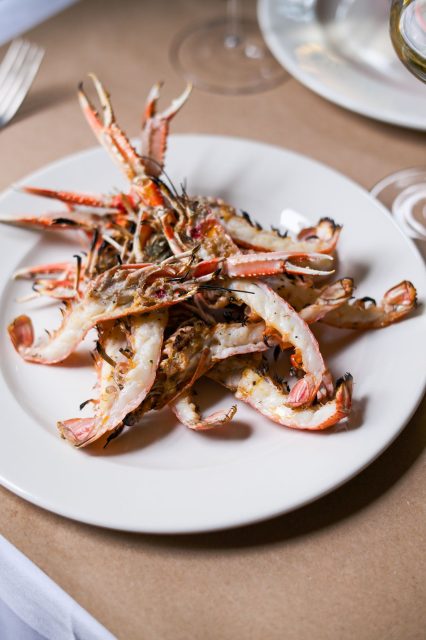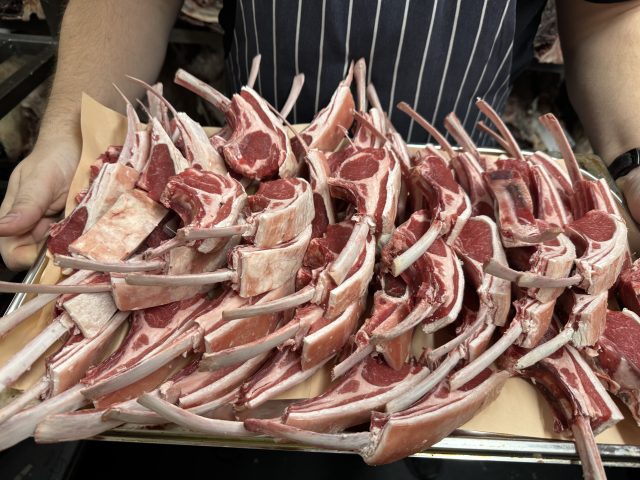Wine List Confidential: The Devonshire
Douglas Blyde visits Oisin Rogers and Charlie Carroll’s The Devonshire. Promising hearty fare, ranging from duck fat chips to bread and butter pudding, as well as great Guinness, can this Soho pub really live up to the hype?

“Nothing beats a good pub — and this is as good as it gets,” wrote Jimi Famurewa in Evening Standard of his sojourn at The Devonshire, while flunking short of awarding it a full five-star compliment. Thereafter he promptly became known as “four-star Jimi” by the minds behind this archetypal pub and grill. Meanwhile, Andy Lynes of the acerbic newsletter, Smashed (andrewlynes.substack.com) had an epiphany during a tour of the on-site butchery. “The aroma of lamb chops, whole Ibérico pig carcasses from double Michelin-starred chef Brett Graham’s farm, and sirloins, deep purple and creamy white with age, was so intense it pervaded the building’s lower floors. The Devonshire is not a pub for vegans…”
Design
Notwithstanding the tenure by “Coqbull” which featured “coqtails” alongside rotisserie chicken, then Jamie’s Italian with its trout vignole, a pub has persisted at this central site since 1793. That was the year the Bank of England introduced the five-pound note, an upshot of gold shortages triggered by the Seven Years’ War, although the almost downy, digestive biscuit-scented Guinness on relentless pour in today’s handsome refurbishment will set you back £6.90.
The minds behind are galvanising publican and mellow singer, Oisin “Osh” Rogers, formerly at the helm of Young’s flagship, The Guinea Grill, Mayfair, Charlie Carroll of the 14-strong Flat Iron restaurant collection, its tendrils reaching from London to Cambridge and Leeds, and Ashley Palmer-Watts, who was Heston Blumenthal’s former right-hand man at The Fat Duck, then leader of Dinner By Heston Blumenthal.

Statuesquely located opposite the Piccadilly Theatre, showing Moulin Rouge! The Musical which was said to deliver “spectacle in spades but not much heart” by Time Out, The Devonshire makes use of every nook of the 13,000 square foot site. At the base are three banks of kegs, and a dry ageing room where head butcher George Donnelly takes carcasses four to five days from slaughter. At ground level, the traditional saloon leads, via a break in the bar counter, to a trio of horseshoe-shaped snugs with bottle cabinets, and then the private “Green Room” featuring images taken to the point of opening by the shadow-loving, Mike Taylor, a Gilbert and George instruction to “fuck em all” on loan, and what Palmer-Watts calls, “a stunningly moody shot of the landlady in the French house” as well as a much-played piano.
Reached via an industrial staircase softened by leather banisters, tracing oxblood walls, are three dining rooms, each furnished with a polished rib trolley, while The Grill Room also stars a radiant bespoke ember grill, and beyond voiles, an incongruously modern, paperless kitchen. We dined here, at paper-covered tables, closely parked, not that it ever felt a challenge, amidst pooches provided water bowls – everything drinks here – babes in arms, and, on his day off, superstar two-starred chef, Andrew Wong. A glass-fronted terrace crowns the stack , adorned by a snarl of sculptural art entitled “London is a Forest” by Acrylicize.
Drinks
Aranged by grape, the two-pager wine list is compiled by Caroll, and former alumni of The Guinea Grill, Sujan Chowdhury and Annabel Hunt, the latter having long ago performed a gap year job with importer, Mentzendorff & Co. By the glass, options range from Sicilian Nero d’Avola and Nerello Mascalese blend, Borgo Selene Rosso 2022 at £7.50 per 175ml, or £28 per bottle versus £13 retail, to £20 for Vincent Besson’s 2019 “Au Clos” from Domaine de Pouilly-Fuissé, being £83 per bottle versus circa £40 on the high street. The highest priced wine is Rotem & Mounir Saouma’s 2018 Omnia at £194, a Grenache led Châteauneuf-du-Pape which may be found for £60 retail. Champagnes include Philiponnat 2016 Blanc de Noirs at £130, being just over double retail, while magnums include 2015 Château Biac from Cadillac at £196 (£90 retail). Priced at £32, an interesting entente between England and Portugal manifests as the lightly cardoon and antler branded Síria, (a.k.a. Roupeiro) from Quinta do Cardo at £32.
This being an opening list, there is vast room for the sort of big gun reds which affluent regulars will demand with the heroic protein, as well as, given the English larder, a wider range of meaningful English sparkling wines. All wines are poured in Jancis Robinson-Richard Brendon stemware. Coffee comes from Palmer-Watts’ own coffee company, Artisan, including “Heroine” espresso
Dishes
Ordered from a menu which is beautifully handwritten by Hunt, dishes were realised by a team led by Palmer-Watts and head chef, Jamie Guy (formerly of HIX, The Gallivant, and Brown’s hotel) with wines prescribed by Hunt, who sported grape cluster earrings.

Partner Content
Served from a tin which would not have looked out of place in an operating theatre, lunch began with a downy brown butter roll with a slim, salted mantle, inspired by the teaching of Daisy Terry of The Dusty Knuckle Bakery. Alongside, Jeroboams’ own non-malolactic, Pinot Meunier dominated Laytons Reserve Brut by Lanson fizzled, succeeding, at least, in delivering value though it would be hard to imagine ever craving a second glass.
Next, Hunt poured the beautifully developed, aforementioned, butterscotch-scented, silky Au Clos with a quartet of scallops. Caressed by three-month barrel-aged Cornish malt vinegar, which discretely informs several dishes, and a hint of citrus, the scallops benefited from a light crumb and home-cured bacon morsels. The wine continued to expand with a pretty brawn toast fried in Ibérico pork fat, which evoked a premium sausage roll, adorned and pepped with sharp pickles and mustard.
With “a pile” of slim langoustines with tender flesh, dressed in the same shellfish and white soy emulsion which accompanies another lobster dish, Hunt chose a wine to “restore faith in Pinot Grigio”, Le Rigiade 2022, a somewhat angular wine perhaps best described as academic rather than dirty weekend.
We were pleased to see a surprise plate of lamb cutlets sourced from Warrens in Launceston arrive, drawing character from the furnace in our midst, fed on the embers of an oak and birch mix. As great a showstopper as anything playing across the way at The Piccadilly Theatre, the glistening specimens featured a micro-chopped mint sauce, evoking Gentleman’s Relish writ large, on the way to becoming chimichurri. Our dining companion likened the perfectly cleaned cutlets to a lamb main course encountered at a gala dinner in California cooked by Alain Passard and Daniel Boulud. “I do remember thinking at the time that it was the best lamb I had ever eaten, and I had a similar thought at lunch on Monday,” he said, adding “they are as gastronomic as anything at our last meal together at Alex Dilling.” With these, Hunt chose a bright yet gritty, frustratingly low production, but inviting of price, 2019 Hungarian Pinot Noir, Kovács Nimród Monopole 777 (referring to the Dijon clone), aged in both Hungarian and French oak.

The Pinot also paired with a bright white fillet of turbot, a valiant understudy for halibut, while Isola e Olena’s always reliable Chianti Classico (2020) was poured with Ibérico pork chop served on the bone which positively cut like polenta, a luscious 11oz ribeye of Angus from Stoddarts in Scotland with Bearnaise, and defining duck fat chips. The latter was devised during Palmer-Watts’ time with Blumenthal, according to restaurateur (of Terrace Rooms & Wine) and restaurant sage, Tom Fahey. These resulted “from the idea of blanching and drying the chips as an extra step before the usual double cooking,” he said, adding, “they used a chamber vac to suck all the water out and I think you got four with a skate dish at The Fat Duck.”
Finally, a sumptuous bread and butter pudding, with brûlée top, the texture of Chinese rice cake, was paired with Peter Lehmann’s botrytis Semillon 22 originally inspired by a visit from then winemaker, Andrew Wigan to Château d’Yquem. This final wine was chosen from a list for which Hunt delploys a laminated lined sheet. “I’ve been carrying it around with me since I had to write letters home to my parents at boarding school.”
Last word
“Rebuilding not reinventing, and bringing consistency” is how Palmer-Watts described the menu. On a cool January day, as swathes of the public wore figurative hair shirts by avoiding anything, their faces contorted, with an alcoholic proof, our long, well-rinsed lunch at The Devonshire proved life-affirming. Unlike Time Out’s critique of Moulin Rouge! The Musical, this is a culinary production which shows huge heart. We look forward to keeping an eye on the expanding cellar as it gains a cast of liquid icons which will keep up with the calibre of the kitchen.
Best for
- Distinguished carnivores
- Bordeaux blends
- Guinness
Value: 93, Size: 85, Range: 91, Originality: 91, Experience: 99; Total: 91.8
The Devonshire – 17 Denman Street, Soho, W1D 7HW; 01243 974500; enquiries@devonshiresoho.co.uk; devonshiresoho.co.uk
Related news
'Rare buying opportunities' as fine wine prices hit a five-year floor




